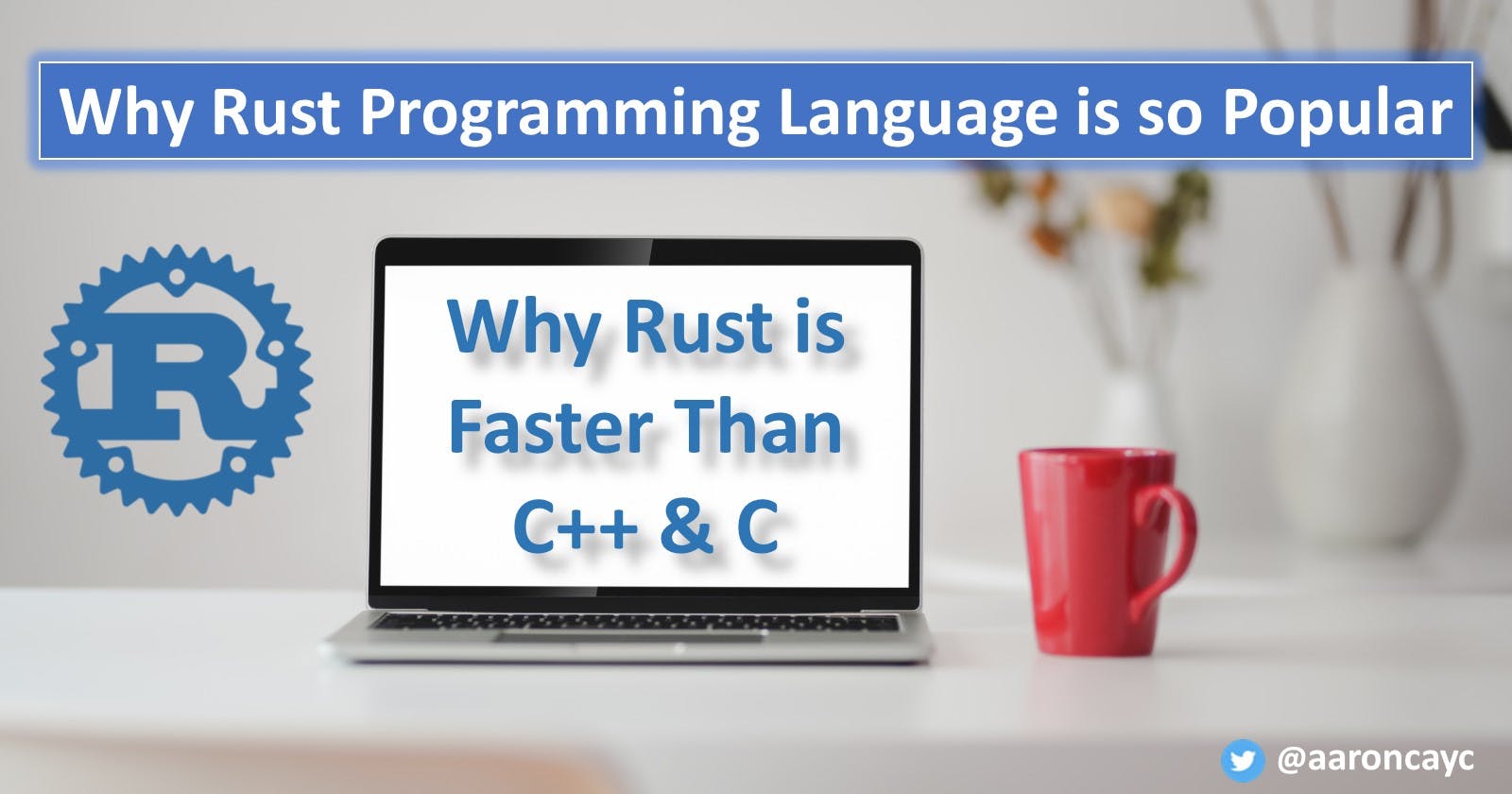Table of contents
Rust is a systems programming language developed by Mozilla that focuses on performance, memory safety, and thread safety. It was first released in 2010, and its stable version was released in 2015. Its syntax is similar to C++ and is designed to be easy to learn for C++ and C developers. Personally, I like Rust because it's exceptionally good and outperforms.
One of Rust's primary features is its ownership system, which ensures that memory is managed correctly at compile time and prevents issues such as data races, null pointer dereferences, and buffer overflows. It also supports functional programming concepts such as closures and pattern matching and has features like iterators, generics, and traits that make it easy to write generic and reusable code.
The best thing is Rust's compiler is known for its powerful optimizations and can detect common programming mistakes, such as null pointer dereferences, at compile-time. As Rust also supports low-level programming, which makes it suitable for systems-level programming tasks such as writing operating systems, game engines, and web browsers.
In recent years, I've noticed that Rust has gained so much popularity, and it is widely used by companies such as Cloudflare, Mozilla [Firefox], Microsoft, Amazon, and Dropbox you name it... Its active community and open-source ecosystem have contributed to its growing popularity and the development of many libraries and tools that make it easier to use.
Features and Benefits

Safety: Rust is designed to prevent memory errors such as null pointers, buffer overflows, and use-after-free errors that can lead to crashes, security vulnerabilities, or unpredictable behavior. Rust's ownership system, borrowing rules, and type system help ensure that the code is safe and correct.
Performance: Rust is designed for performance-critical tasks and can often match or even exceed the performance of C and C++ code. Rust achieves this through its zero-cost abstractions, low-level control, and efficient memory management.
Concurrency: Rust provides safe and efficient concurrency support through its ownership system and async/await syntax. This makes it easy to write concurrent code that takes advantage of modern hardware without introducing data races or other concurrency bugs.
Compatibility: Rust is compatible with C and C++ code, which makes it easy to integrate Rust code into existing projects or use Rust to write performance-critical components for existing systems.
Open-Source Ecosystem: Rust has a vibrant open-source community that has contributed to the development of many libraries, tools, and frameworks that make it easier to use Rust. This includes web frameworks, game engines, databases, and many other tools.
Cross-Platform: Rust supports a wide range of platforms, including Windows, Linux, macOS, and many embedded systems. This makes it a versatile language for writing software that runs on different platforms.
Learning Resources: For those who want to start with Rust, let me tell you there are many resources available for learning [head over to https://www.rust-lang.org/learn ], including online tutorials, books, and a supportive community. This makes it easy for developers to get started with Rust and develop their skills over time.
Why Rust Is Faster Than C++ and C

Lately, I commented on a tweet about Rust, that its faster than C++ :
and someone replied that I was wrong about Rust and in fact 'Rust is a lot slower':
So here are some facts that Rust is faster than C++ and C:
Memory Safety: Rust guarantees memory safety at compile-time, which means that memory-related errors such as null pointer dereferences, buffer overflows, and dangling pointers are prevented before the code is executed. In contrast, C++ and C do not have such guarantees, and memory-related errors can lead to crashes or security vulnerabilities. Preventing these errors at compile-time allows Rust to optimize the code and make it faster than C++ and C.
Zero-Cost Abstractions: It's a biggie, Rust provides high-level abstractions such as closures, iterators, and generics, but they do not come with a performance cost. This is because Rust's abstractions are designed to be compiled down to efficient machine code that runs as fast as hand-written C++ or C code. In contrast, C++ and C's abstractions come with performance overheads, which can slow down the code.
Ownership Model: Rust has a unique ownership model that ensures safe memory management and eliminates the need for a garbage collector. This ownership model allows Rust to optimize memory usage and reduce overheads that are associated with garbage collection. In contrast, C++ and C do not have such a model and rely on manual memory management, which can lead to memory leaks and other memory-related errors.
Concurrency: Rust provides safe and efficient concurrency support through its ownership model and the use of lightweight threads called "async tasks." This concurrency support allows Rust to take advantage of modern hardware architectures and improve performance. In contrast, C++ and C do not have such concurrency support, and implementing concurrent code in these languages can be error-prone and require significant effort.
Compiler Optimizations: Many people don't even know that Rust's compiler is designed to optimize the code aggressively and take advantage of modern hardware architectures. This optimization allows Rust code to run faster than C++ and C code, especially in cases where the code uses Rust's advanced features such as closures and iterators.
It's not that I believe, it's a fact that Rust's unique features such as memory safety, zero-cost abstractions, ownership model, concurrency support, and compiler optimizations allow it to outperform C++ and C in many scenarios.
Summary
In a nutshell, Rust is a modern programming language that offers many features and benefits, including safety, performance, concurrency, compatibility, an open-source ecosystem, cross-platform support, and learning resources. These features make it a compelling choice for developers who need to write fast, safe, and reliable software.
Consider subscribing to my blog for more updates on my progress journey and I'd help you along the way to shorten your path by sharing more solutions and insights based on my experience.
Subscribe to my Newsletter: https://blogging.aaroncayc.me/newsletter
Follow me on Twitter: https://twitter.com/aaroncayc
Subscribe to Youtube: https://youtube.com/@aaroncayc

